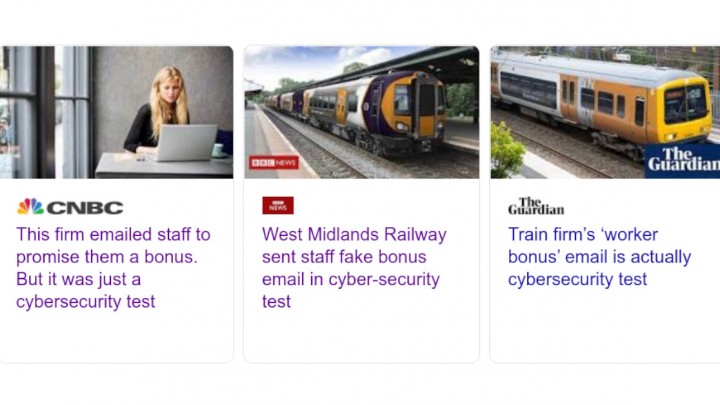Oburzenie po wiadomościach email o bonusie dla pracowników West Midlands Trains, które były tylko testem
Pracownicy kolei w West Midlands dostali email z nagrodą za ciężką pracę w trakcie pandemii - to był tylko test.
Około 2,500 tysiąca pracowników West Midlands Trains dostało wiadomość email, w której zostali oni poinformowani o nagrodzie finansowej za ciężką pracę w trakcie pandemii.
Po kliknięciu w link, który sugerował odebranie nagrody, pracownik został przekierowany na stronę, a następnie dostał kolejny email z informacją, że nagrody finansowej nie ma, a wiadomości są tylko testem cyberbezpieczeństwa specjalnie zaprojektowanym przez zespół IT.
Sprawa wywołała wielkie oburzenie wśród pracowników, a także związków zawodowych.
Transport Salaried Staffs' Association nazwała ten test głupim i nagannym zachowaniem. Związek zaapelował także do kolei o wywiązanie się z obietnicy nagrody finansowej dla pracowników. Główny sekretarz związku Manuel Cortes powiedział, że to działanie jest szokujące i cyniczne, wykorzystano nadzieję pracowników na nagrodę za ciężką pracę podczas pandemii, do przeprowadzenia wewnętrznych testów firmie.
Rzecznik prasowy West Midlands Trains oznajmił, że koleje bardzo poważnie traktują kwestie cyber-bezpieczeństwa i test ten został specjalnie stworzony, aby imitować wiadomości jakie są wysyłane przez hakerów próbujących podszyć się pod firmę i wydobyć dane personalne pracowników. Rzecznik dodał także, że oszustwa tego typu kosztują branże transportowa miliardy funtów rocznie.
Informacja o kontrowersyjnym teście obiegła media na całym świecie i wywołała ogólne oburzenie i falę negatywnych komentarzy w mediach społecznościowych.
Treść pierwszej wiadomości
*Text of the email offering bonuses to WMT staff -
Dear All,
Thank you for your hard work. We realise that a huge strain was placed upon a large number of our workforce as a result of COVID-19. This has not been easy for any of us and we would like to offer you a one-off payment to say thank you for all of your hard work over the past 12 months or so.
Please visit the following link which has a personal message from Julian Edwards as well as the information of your one-off payment: Message From Julian -
Again, many thanks for your hard work and I hope that this gift will inspire you to keep up the good work.
Regards,Finance and Payroll.
Treść wiadomości po kliknięciu w link i podaniu danych
*Text of email by WMT HR to employees who had opened the email link -
Sent via email
Re: IT Test email on 21st April 2021
Dear (redacted)
I am writing to you to update you on the outcome of the recent phishing simulation test performed by IT. In the email, you were invited to click on a link, and on the next page to enter your Microsoft Office 365 login (your work account) details.
I am writing to confirm that this was a test designed by our IT team to entice you to click the link and used both the promise of thanks and financial reward to try and convince you to provide your details. This test was purposefully designed to closely mimic the tactics that, sadly, are being used on a daily basis by expert criminal organisations to try to gain access to company data and systems.
We, along with every organisation, remain susceptible to attempts to access our systems and data. It is crucial that we all play our part as just one error can be enough to result in significant damage.
Below are the main points to remember when using work systems at WMT:
· Be vigilant with all links and attachments.
· Never click on a link that looks suspicious.
· Never enter your work login details into anything other than the first time you log in to your WMT work system or known business provided systems.
· If you are unsure about whether something is suspicious, stop, do not proceed, and contact the WMT IT Service Desk team on 0344 7700 791.
· If you receive an email that suggests you must do something, sometimes quickly, in order to benefit (e.g. ‘click here now to receive this reward’, click this in the next 30 minutes to receive your payment’, ‘if you do not click this, you will miss out’), then it is likely to be a hoax and/or be part of a planned cyber-attack. In these situations, the best advice is to remember that you will not miss anything by not clicking a link in a work setting.























Comments